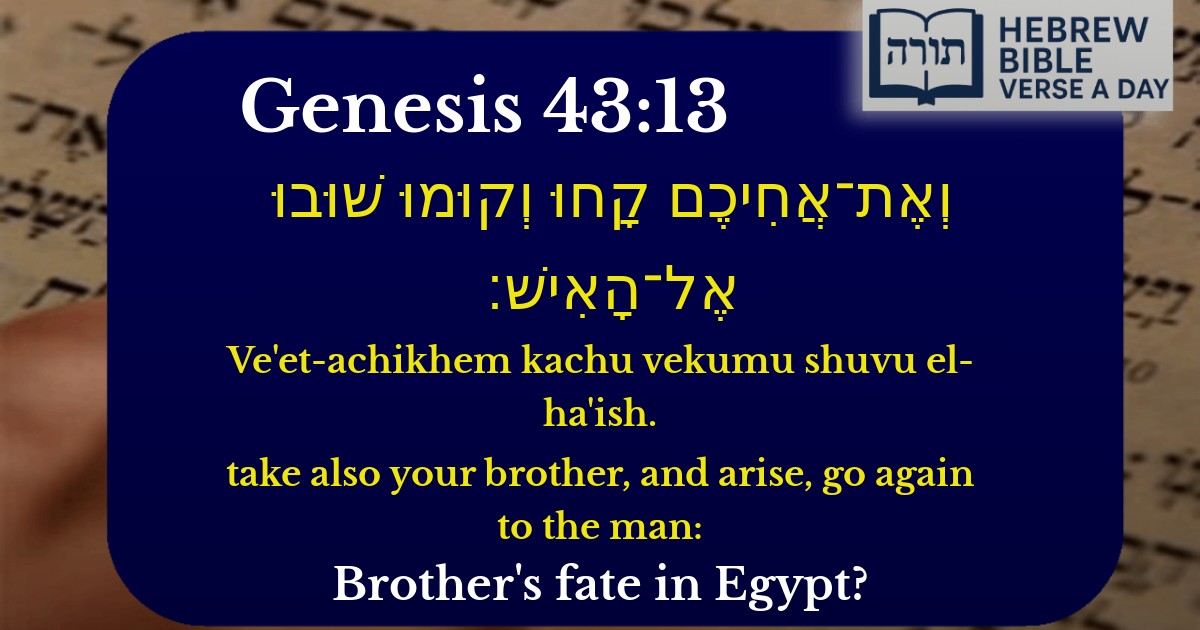Join Our Newsletter To Be Informed When New Videos Are Posted
Join the thousands of fellow Studends who rely on our videos to learn how to read the bible in Hebrew for free!
Hebrew Text
וְאֶת־אֲחִיכֶם קָחוּ וְקוּמוּ שׁוּבוּ אֶל־הָאִישׁ׃
English Translation
take also your brother, and arise, go again to the man:
Transliteration
Ve'et-achikhem kachu vekumu shuvu el-ha'ish.
Hebrew Leining Text
וְאֶת־אֲחִיכֶ֖ם קָ֑חוּ וְק֖וּמוּ שׁ֥וּבוּ אֶל־הָאִֽישׁ׃
וְאֶת־אֲחִיכֶ֖ם קָ֑חוּ וְק֖וּמוּ שׁ֥וּבוּ אֶל־הָאִֽישׁ׃
🎵 Listen to leining
Parasha Commentary
📚 Talmud Citations
This verse is quoted in the Talmud.
📖 Chullin 91a
The verse is referenced in the context of discussing the actions of Jacob's sons when they returned to Egypt with Benjamin, illustrating their fulfillment of Joseph's demand to bring their brother.


Context in the Torah Narrative
This verse (Bereshit 43:13) appears in the story of Yosef and his brothers, when Yaakov instructs his sons to return to Egypt with Binyamin to obtain food during the famine. The brothers had previously returned from Egypt without Binyamin, as Yosef had demanded his presence as a condition for further assistance.
Rashi's Commentary
Rashi explains that Yaakov's instruction to "take also your brother" refers specifically to Binyamin. He notes that Yaakov uses the term "הָאִישׁ" (the man) to refer to Yosef, indicating his high status as the Egyptian viceroy, though the brothers did not yet recognize him as their brother. Rashi emphasizes that Yaakov's phrasing shows deference to Yosef's position of authority.
Ibn Ezra's Insight
Ibn Ezra observes that the phrase "קוּמוּ שׁוּבוּ" (arise, go again) contains two imperatives to stress urgency. The famine was severe, and the family's survival depended on securing more food from Egypt. The doubling of verbs underscores the critical nature of their mission.
Midrashic Interpretation
The Midrash (Bereshit Rabbah 91:10) connects this moment to broader themes of repentance (teshuvah). The brothers' return to Egypt with Binyamin parallels the spiritual concept of "returning" to rectify past wrongs—in this case, their earlier mistreatment of Yosef. The Midrash sees this as a step toward their eventual reconciliation.
Rambam's Ethical Perspective
In light of Rambam's teachings on family unity (Hilchot De'ot 6:3), this verse demonstrates Yaakov's concern for maintaining peace among his children. Despite his fear for Binyamin's safety (as seen in later verses), Yaakov prioritizes the collective need for sustenance and the importance of obeying the Egyptian ruler's decree for the greater good.
Key Lessons